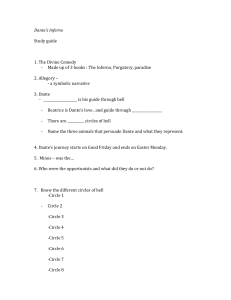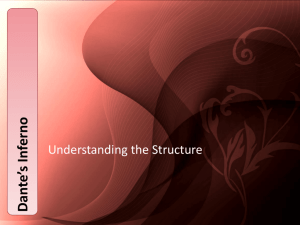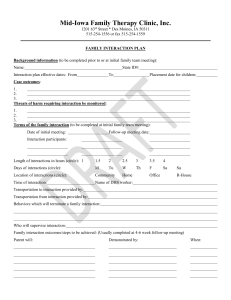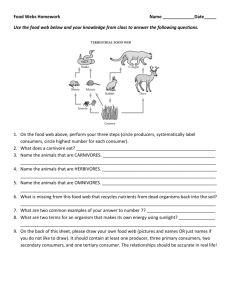Inferno
advertisement
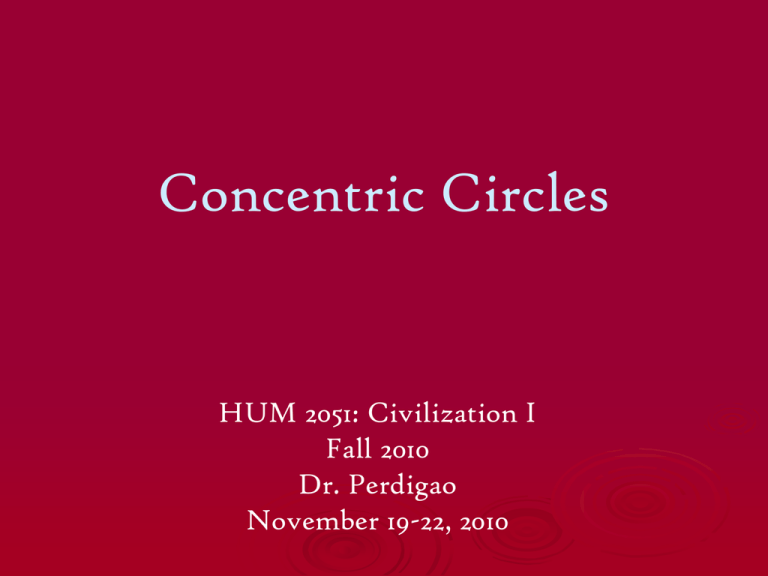
Concentric Circles
HUM 2051: Civilization I
Fall 2010
Dr. Perdigao
November 19-22, 2010
From Tragedy to Comedy
“A further distinction between Dante and Virgil is generic: in Inferno 20,
Virgil refers to his poem as “my high tragedy”; in the next canto, Dante
calls his poem “my Comedy.” What are the differences between tragedy
and comedy? In the Middle Ages, there are essentially four. First,
narrative structure: a tragedy begins in happiness and ends in misery, while
a comedy works in reverse, so that Dante begins in Hell and ends in
Paradise. Second, style: tragedy is exalted in style, while comedy can
indulge in a range of styles, and we see this in the Inferno, for example,
where canto 21 provides a wonderful scene of a group of naughty devils
who tease Virgil by pretending to be Roman soldiers but then, as they set
off on their march, signal their departure with an obscene gesture. Third,
character: a tragedy deals with important historical figures, while a comedy
deals with all sorts of people, the common as well as the high-born—and
certainly this is true of Dante’s poem. And fourth, subject matter: tragedy
deals with events of grand historical importance while comedy deals with
people’s private or inward lives.” (1462-1463)
Mentor(ing) and Piety
“You alone are my teacher, the first of all my authors, / and you alone the
one from whom I took / the noble style that was to bring me honor” (1:
1467).
“O Muses! O high genius! Help me now! / O memory that wrote down
what I saw, / here your true excellence shall be revealed” (2: 1469).
“But why am I to go? Who allows me to? / I am not Aeneas, I am not
Paul” (2: 1469).
Combatant Forces
“I am Beatrice, who urges you to go; / I come from the place I am longing
to return to; / love moved me, as it moves me now to speak” (2: 1470).
“I AM THE WAY INTO THE DOLEFUL CITY, / I AM THE WAY
INTO ETERNAL GRIEF, / I AM THE WAY TO A FORSAKEN
RACE. / JUSTICE IT WAS THAT MOVED MY GREAT CREATOR;
DIVINE OMNIPOTENCE CREATED ME, AND HIGHEST
WISDOM JOINED WITH PRIMAL LOVE. / BEFORE ME
NOTHING BUT ETERNAL THINGS / WERE MADE, AND I
SHALL LAST ETERNAL. / ABANDON ALL HOPE, ALL YOU WHO
ENTER” (3: 1472).
(Re)Placing the Tradition
Canto IV—First Circle of Hell—all poets: Homer, Horace, Ovid, and
Lucan; greatest non-Christian thinkers and other famous historical figures:
Electra, Aeneas, Caesar, Saladin, Aristotle, Plato, Orpheus, Cicero,
Avicenna, Averroes.
“Now let us honor our illustrious poet, / his shade that left is now returned
to us” (IV: 1476).
“Since they all share one name with me, the name / you heard resounding
in that single voice, / they honor me and do well doing so” (IV: 1477).
“Greater honor still they deigned to grant me: / they welcomed me as one
of their own group, / so that I numbered sixth among such minds” (IV:
1477).
Closer Readings
“We have already seen how at a crucial moment in the Inferno (canto 9)
Virgil seeks to cover Dante’s eyes while Dante himself urges the reader to
uncover the meaning of the events being portrayed” (1463). {“Now turn
your back and cover up your eyes, / for if the Gorgon comes and you
should see her, / there would be no returning to the world!” / These were
my master’s words. He turned me round / and did not trust my hands to
hide my eyes / but placed his own on mine and kept them covered” (1492).}
On Francesca (Cantos V): “The challenge of the scene is to remember its
deep significance—that this woman is in Hell, that she is currently
repeating the very sin that put her there—while she does everything in her
power to make you forget” (1464). {“I swooned as though to die, / and fell
to Hell’s floor as a body, dead, falls” (V: 1481).}
In Hell
First Circle (Limbo, virtuous non-Christians): Homer, Horace, Ovid,
Hector, Aeneas, Caesar, Aristotle, Plato (and Virgil)
Second Circle (Lustful): Dido, Helen, Achilles, Paris, Francesca and Paolo
Third Circle (Gluttons): Ciacco (Florentine, prophecy)
Fifth Circle: Filippo Argenti (Black Guelph, enemy, wrathful)
Sixth Circle (Heretics): Farinata (Ghibelline), Cavalcante de Cavalcanti
(who asks about son Guido)
Seventh Circle (Violence): Brunetto Latini (learns about own exile)
Geryon—descent into eighth circle
Malebolge
Eighth Circle, Third Bolgia (Simonists): Pope Nicholas III (mistakes
Dante for Boniface VIII)
Eighth Circle, Fourth Bolgia (Soothsayers): Tiresias; piety vs. pity
Eighth Circle, Seventh Bolgia (Thieves): Vanni Fucci (prophesizes strife
in Florence)
Eighth Circle, Eighth Bolgia (Deceivers): Ulysses and Diomed
Eighth Circle, Tenth Bolgia (Falsifiers): Myrrha (Ovid), the Potiphar’s
Wife, Sinon the Greek
Ninth Circle (Treacherous): Judas Iscariot, Brutus, and Cassius, with
Judas suffering the most, betrayers of Christ and the empire
On Endings
Inferno: “My guide and I entered that hidden road / to make our way back
up to the bright world. / We never thought of resting while we climbed. /
We climbed, he first and I behind, until, / through a small round opening
ahead of us / I saw the lovely things the heavens hold, / and we came out
to see once more the stars.” (1576)
Paradiso: “As the geometer who tries so hard / to square the circle, but
cannot discover, /think as he may, the principle involved, / so did I strive
with this new mystery: / I yearned to know how could our image fit / into
that circle, how could it conform; / but my own wings could not take me
so high— / then a great flash of understanding struck /my mind, and
suddenly its wish was granted. / At this point power failed high fantasy /
but, like a wheel in perfect balance turning, / I felt my will and my desire
impelled / by the Love that moves the sun and the other stars.” (1597)
